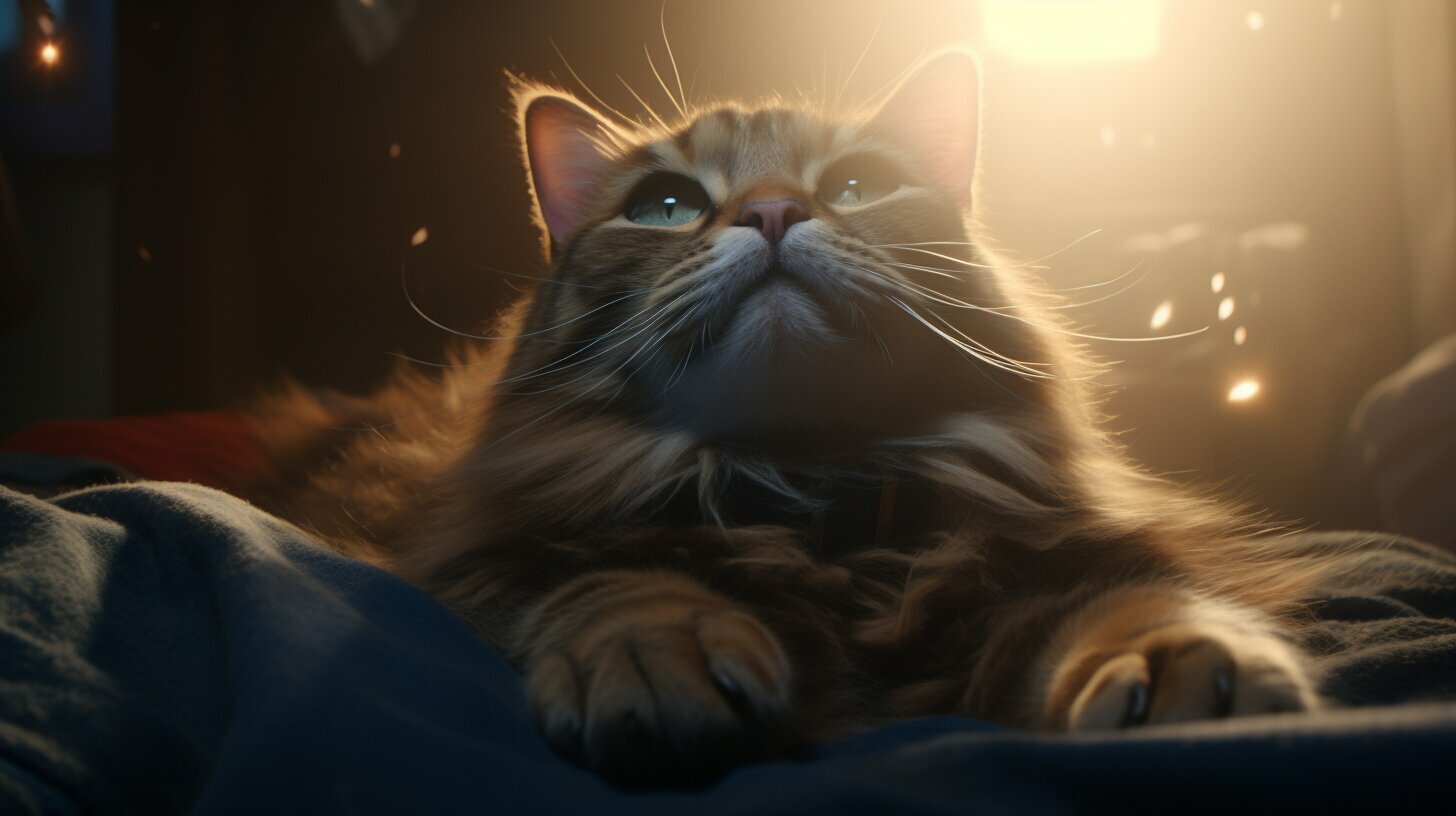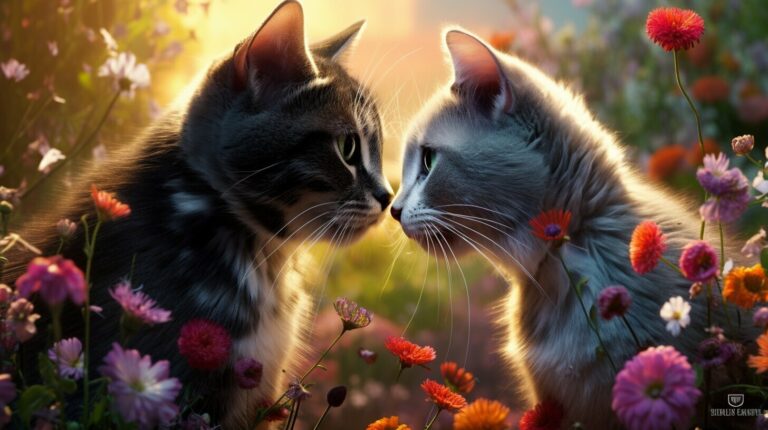Unveiling the Mystery: Why Do Cats Purr When They Are Dying?
Have you ever wondered why cats purr when they are dying? It’s a fascinating phenomenon that has puzzled researchers for years. While the exact reasons behind this behavior remain uncertain, there are several theories that offer possible explanations.
One theory is that cats purr as a form of self-soothing mechanism during times of stress or pain. Purring releases endorphins in cats, which can lower stress hormones and help with healing. The vibrations produced during purring may also promote bone growth and tissue repair, offering some comfort and relief during their final stages.
Furthermore, cats may purr when they are dying as a way to communicate or seek comfort. This behavior may signify a desire for reassurance and connection with their human companions. However, it is important to note that not all cats purr when they are dying, and purring is not always a sign of happiness. The emotional state of a cat during their last moments can be a mix of fear, confusion, or vulnerability.
Key Takeaways:
- The reason why cats purr when they are dying is still a mystery.
- Purring may serve as a self-soothing mechanism during times of stress or pain.
- Purring releases endorphins, which can lower stress hormones and aid in healing.
- The vibrations produced during purring may promote bone growth and tissue repair.
- Cats may purr when they are dying as a way to communicate or seek comfort.
- Purring is not always a sign of happiness and can be influenced by a mix of emotions.
- Understanding a cat’s overall behavior and body language is crucial when interpreting their purring, especially during their last moments.
When cats are facing their final moments, purring may serve as a self-soothing mechanism. This behavior has intrigued researchers, and while the exact reasons behind it remain elusive, several theories have emerged. One hypothesis suggests that purring is a way for cats to comfort themselves during times of stress or pain. The vocal vibrations produced during purring release endorphins in cats, which can help lower stress hormones and aid in the healing process. It’s almost as if they are creating their own source of emotional support.
Additionally, the vibrations produced during purring may have physical benefits for cats as well. Some researchers believe that these vibrations promote bone growth and tissue repair, providing a comforting presence during their final stages. It’s fascinating to think that something as instinctual as purring could potentially have such profound effects on a cat’s well-being.
Moreover, purring can also be a form of communication or a means of seeking comfort from their human companions. Cats are incredibly intuitive creatures, and during their last moments, they may purr as a way to convey their needs or seek reassurance. It’s important to pay attention to their overall behavior and body language to interpret their communication accurately.
However, it’s crucial to remember that not all cats purr when they are dying, and purring is not always a sign of happiness. In some cases, cats may purr as a result of mixed emotions, including fear, confusion, or vulnerability. Understanding the broader context of a cat’s behavior, including changes in appetite, energy levels, and mobility, can help provide a more holistic understanding of their purring.
In conclusion, the reason why cats purr when they are dying remains uncertain, but researchers have uncovered some possible explanations. Purring may serve as a self-soothing mechanism, releasing endorphins to alleviate stress and aid in healing. The vibrations produced during purring may also have physical benefits, promoting bone growth and tissue repair. Additionally, purring can be a form of communication or a means of seeking comfort. However, it’s essential to consider the individual cat’s behavior and body language to interpret their purring accurately. Ultimately, the mysteries surrounding why cats purr when they are dying add to the marvel and complexity of these fascinating creatures.
Potential Health Benefits of Purring
It is believed that the vibrations created by purring can have certain health benefits for cats, even in their dying moments. One theory suggests that these vibrations may help promote bone growth and tissue repair. When a cat purrs, the vibrations can stimulate cells and tissues, potentially aiding in the healing process. While more research is needed to fully understand the extent of these benefits, it is fascinating to consider the potential positive impact of purring on a cat’s physical well-being.
Furthermore, the act of purring itself can serve as a self-soothing mechanism for cats in their final stages. Purring releases endorphins in cats, which are natural painkillers and can help lower stress hormones. This self-soothing effect may provide some comfort to cats as they navigate through times of stress or pain. It is truly remarkable how cats have evolved this unique ability to comfort themselves through the simple act of purring.
When a cat is nearing the end of its life, purring can also be a means of communication and seeking comfort. Cats are social animals and often seek reassurance and connection from their human companions. Purring during their last moments may serve as a way for them to express their needs and seek comfort from their loved ones. It is important for cat owners to be attuned to these signals and offer support and presence during this sensitive time.
| Purring and Health Benefits Summary |
|---|
| Purring creates vibrations that may promote bone growth and tissue repair. |
| Purring releases endorphins, which can help lower stress hormones and provide pain relief. |
| Cats may purr to communicate their needs and seek comfort during their last moments. |
Although the exact reasons behind why cats purr when they are dying remain uncertain, the potential health benefits and emotional significance of purring during this time are worth exploring. As cat owners, it is our responsibility to observe and understand our feline companions, being present and supportive as they navigate through their final stages of life. The bond between humans and cats runs deep, and purring is just one of the many ways these incredible creatures communicate and seek solace in their final moments.
Communication and Seeking Comfort
Purring in dying cats might also serve as a way for them to communicate and seek comfort from those around them. While it’s true that not all cats purr when they are dying, for those that do, it can be a way to express their needs or emotions during their last moments. As cat owners, it is important to pay attention to their purring and try to understand the messages behind it.
According to experts, the vibrations produced during purring can have a calming effect on both the cat and those nearby. This gentle rumbling has been associated with a desire for reassurance and connection. When a cat purrs in their final stages, it may be a way for them to express their vulnerability and seek comfort from their human companions.
It is worth noting that purring is not always a sign of happiness in cats, especially when they are nearing the end of their lives. Cats may purr due to a mix of emotions, including fear, confusion, or discomfort. Therefore, it is crucial to observe their overall behavior and body language to gain a better understanding of their emotional state.
| Signs of a Dying Cat Purring |
|---|
| • Soft and gentle purring sounds |
| • Increased purring frequency |
| • Seeking more physical contact |
| • Restlessness or agitation |
While the exact reasons why cats purr when they are dying remain uncertain, this behavior can provide valuable insights into their emotional and physical well-being during their final moments. By being attentive and supportive, we can help our feline companions find comfort and peace in their twilight days.
Purring and Emotional State
Contrary to popular belief, cats may purr before they die not necessarily due to happiness, but rather due to a range of emotions they might be experiencing. Purring is a complex behavior that can serve different purposes depending on the situation and the individual cat. While purring is often associated with contentment and pleasure, it can also be a means of communication and seeking comfort.
When a cat is nearing the end of its life, it may purr as a way to communicate its needs or seek solace from its human companions. In these moments, the cat may be feeling vulnerable, fearful, or confused, and purring can serve as a way to express these emotions. It can be a way for the cat to seek reassurance and connection from those around them.
Quote: “Purring is often seen as a sign of contentment in cats, but it can also be a way for them to cope with pain, anxiety, or distress,” says Dr. Emily Richards, a veterinarian specializing in feline behavior.
Additionally, purring is thought to have a self-soothing effect on cats during times of stress or pain. The physical act of purring releases endorphins, which are natural pain relievers, and can help lower stress hormones in cats. This may provide some comfort and aid in the healing process. The vibrations produced during purring may also have benefits on a cat’s physical well-being, potentially promoting bone growth and tissue repair.
The Importance of Understanding the Broader Context
It is important to note that not all cats purr when they are dying, and purring is not always indicative of happiness. Each cat is unique, and their individual circumstances, personality, and overall health can influence their purring behavior. To interpret a cat’s purring accurately, it is crucial to consider the broader context, including their body language and other signs of distress or discomfort they may be showing.
In conclusion, the reasons behind why cats purr when they are dying remain a mystery. However, researchers have uncovered some possible explanations, including purring as a self-soothing mechanism, a means of communication and seeking comfort, and a way to cope with a range of emotions. While we may never fully understand the intricacies of this behavior, observing and empathizing with our feline companions can provide valuable insights into their well-being during their final moments.
| Key Points: |
|---|
| Cats may purr before they die due to a range of emotions they might be experiencing, not necessarily happiness. |
| Purring can be a means of communication and seeking comfort during the cat’s final moments. |
| Purring is thought to have a self-soothing effect, releasing endorphins and potentially aiding in the healing process. |
| Each cat is unique, and it is important to consider the broader context when interpreting a cat’s purring behavior. |
Conclusion
In conclusion, purring in dying cats remains a captivating mystery, but by closely observing their behavior, we can gain a deeper understanding of this unique form of communication.
The reason why cats purr when they are dying is still a mystery, but researchers have uncovered some possible explanations. One theory is that cats purr as a form of self-soothing mechanism during times of stress or pain. Purring releases endorphins in cats, which can lower stress hormones and help with healing. The vibrations produced during purring may also promote bone growth and tissue repair.
Additionally, cats may purr when they are dying as a way to communicate or seek comfort. However, it is important to note that not all cats purr when they are dying, and purring is not always a sign of happiness. The exact triggers for purring and its purpose in different situations are still not fully understood.
In conclusion, while the reasons behind why cats purr when they are dying are not yet fully known, studying their behavior can offer valuable insights into this phenomenon. By paying attention to their overall behavior and body language, we can better interpret their purring and provide the support and care they need during their final moments.
FAQ
Why do cats purr when they are dying?
The reason why cats purr when they are dying is still a mystery. However, one theory suggests that cats purr as a form of self-soothing mechanism during times of stress or pain. It releases endorphins, which can lower stress hormones and aid in healing.
Does purring have any health benefits for dying cats?
The vibrations produced during purring may promote bone growth and tissue repair, potentially offering some comfort and relief during their final stages.
Do all cats purr when they are dying?
Not all cats purr when they are dying. Purring is not always a sign of happiness, and the exact triggers for purring in different situations are still not fully understood.
Is purring a way for dying cats to communicate or seek comfort?
Cats may purr when they are dying as a way to communicate their needs or seek comfort from their human companions. It can signify a desire for reassurance and connection during their final moments.
What emotional state can cause cats to purr when they are dying?
Purring before death can be a mix of emotions, including fear, confusion, or vulnerability. It is important to understand the broader context and body language of a cat’s behavior.






